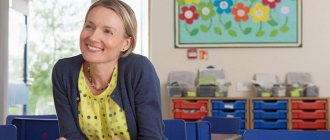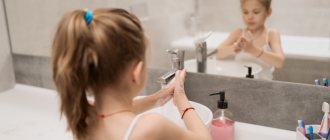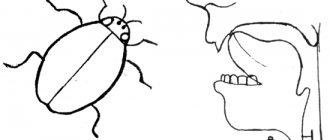Notes and plans for parent meetings
Contained in sections:
- Working with parents. Interaction with families 11727
Includes sections:
- Gender education. Parent meetings 42
- Final parent meetings 449
- Master classes for parents 3254
- Traffic rules Parent meetings 336
- Minutes of parent meetings in kindergarten 482
- Parent meeting at the beginning of the year, introduction 287
By groups:
- Senior group
- Preparatory group
- Middle group
- Junior group
Showing publications 1-10 of 14681. All sections | Parent meetings in kindergarten
New
Photo
The best
Parent meeting “Possibilities of using kinetic sand for the development of a child” Purpose: To acquaint parents with kinetic sand, the possibilities of using kinetic sand for the development of a child. To achieve the goal, I formulated the following tasks: 1. to introduce parents to the properties , composition of kinetic sand, as well as the features...
Master class script for parents “Creativity in everything!” on the topic “TRIZ - ARIZ” Objectives: 1. To acquaint parents with the methods and techniques of TRIZ - ARIZ. 2. Increase the competence of parents in the field of innovative technologies. 3. Introduce parents to the methods of playing games. 4. Cultivate a desire to help your child, the ability to find contact with him….
ORGANIZATIONAL PARENTAL MEETING IN THE SENIOR GROUP.material (senior group)
ORGANIZATIONAL PARENTS MEETING IN THE SENIOR GROUP.
Prepared by: teacher of the MDOU “CRR “Iskorka” - d/s No. 24 Shvyrkova Irina Vladimirovna.
Time: beginning of September.
Form of conduct: conversation - dialogue between the teacher and parents of older children.
Objectives: to familiarize parents of pupils with the age characteristics of children in the older group (5-6 years old); tasks of education and training; features and conditions of educational work in the senior group; the goals and objectives of a preschool educational institution for the coming school year, familiarizing parents with games and exercises that help prepare the hand of a child of senior preschool age for writing.
Event plan:
- The ceremonial start of the meeting, congratulating parents on the start of the school year.
- Teacher's speech:
- age characteristics of older children;
- tasks of education and training in accordance with the implemented educational program;
- daily routine, class schedule;
- organization of additional education: free group work.
- Meeting with specialists who will work with children during the school year.
- Speech by the group teacher on the topic “The importance and methods of developing fine motor skills in children of the older group.”
5. Meeting the parents of children new to the group.
6. Elections of the parent committee of the group.
7. Approval of a joint work plan for the academic year.
PROGRESS OF THE MEETING
1. Preparatory stage.
The teacher thinks over the form of inviting the parents of the students.
The teacher invites one or two specialized specialists who will work with the group’s students during the upcoming school year (physics supervisor, preschool psychologist) to the first parent meeting and discusses with each of them the approximate content of the speech.
The teacher, if necessary, can invite a representative of the preschool administration to the parent meeting.
2. Organizational stage.
Parents are seated randomly.
Opening of the meeting.
The teacher begins the parent meeting. (Traditional greeting).
Good evening, dear parents. At the beginning of the meeting, I would like to congratulate you on the children’s transition to the senior group, on this stage of growing up.
From the first of September, everything is new for your children: a different routine, two to three lessons a day, thirteen hours a week. We will write a lot in notebooks and color more. And we will write with a pencil, not a pen, and color with colored pencils, not felt-tip pens, because... It is the pencil that allows you to develop optimal pressure on the paper, which will be so important in school for developing writing skills. In addition, developing the ability to make precise, clear strokes with a pencil is very important for the development of fine motor skills of the hand. The pencil allows you to evenly load the small muscles of the hand, without overstraining the muscles of the shoulder and elbow.
Now you and I are one big team. Together we have to rejoice and overcome difficulties, grow up and prepare for school. I hope that all this year our team will be friendly and united, because only together, all together, we will overcome all the difficulties in raising and educating children. If you have any questions, come and we will solve them together.
Now, let's play a little. A game. Take everything one flower at a time. Color them (on the tables there are identical white flowers in size, shape, colored pencils). Now compare your flower with the flowers of your neighbors. All the flowers were the same in color, size, and shape. Tell me, after you have painted a flower, is it possible to find two completely identical flowers? (No). We adults, under the same conditions, do everything differently. Therefore, never compare your child with another! There is no one or something better or worse. There is something else. We will compare the results of the same child. This is called monitoring (in September, in May). We will do this in order to know how and what to do with it tomorrow, in order to grow every day, not only in studies, but also in actions.
Success is every step a student takes on the path to new achievements. And so that you can see the achievements of your children, there is a portfolio. This portfolio will store all your children’s work and their achievements, so actively take part in the competitions that I will tell you about. (you need to purchase a folder with files).
Information stage of the meeting.
Today at the first parent meeting we will look at the age characteristics of children in the older group; tasks of education and training in accordance with the implemented educational program; daily routine, class schedule; organization of additional education.
Speech on the topic: “Senior preschool age - what is it like?”
The age from 5 to 6 years is a new important stage in the development and upbringing of a preschool child.
Raising 5-year-old children is a qualitatively new stage compared to raising children of middle preschool age. The success of a child in a preparatory group or school will largely depend on how carefully you and I will approach the solution of educational tasks this year.
The transition of children to the older group is associated with some changes in the conditions of their life and upbringing: they are now included in systematic and more complex collective activities (play, work, learning). Both the program and teaching methods acquire the character of educational activity.
Children of the 6th year of life can accurately follow the rules of outdoor play, look at books for a longer time, draw, and sculpt. Due to these features, the duration of educational activities is now 25 minutes.
In 5-year-old children, voluntary attention increases. Thanks to richer childhood experiences, imagination becomes meaningful. All this needs to be developed both in kindergarten and at home. It is very important to take care of the development of children’s thinking and speech; it is necessary to answer children’s questions that express interest in cause-and-effect relationships (why? why, listen to their stories about plans and aspirations (what and how they will do, what to play, etc. .).
The life of children of this age is much more emotional and richer than at the previous stage, their feelings are deeper and longer lasting. The beginnings of intellectual feelings appear. Children's aesthetic experiences are varied - they are pleased with the beauty in nature and surroundings, they experience pleasure from good songs and paintings, and strive to introduce elements of beauty into their drawings and games.
At 5-6 years old, a child absorbs all cognitive information like a sponge. Parents are an example for children, therefore, if parents convey positive information, if the child is good at heart, there is no fear, resentment, or anxiety, then any information (personal and intellectual) can be instilled in the child.
The child learns from his parents the basics of behavior in society, never forget about this.
Dear parents, by visiting the group and participating in its activities, you have the opportunity to learn more about the interests, passions, and some of the reasons for your child’s behavior. Children always proudly bring drawings and crafts made together with moms and dads, let's give joy to your children through joint creativity.
Realizing the value of the active participation of parents in the life of the group, we are waiting for you as partners, participants, and contributors!
So, taking into account the above-mentioned age characteristics of children of the 6th year of life, it is necessary to carry out the following tasks:
• develop children’s movements, achieve greater coordination, accuracy, and speed;
• cultivate independence and speed of movement during self-service;
• expand children’s ideas about social life, nature, and the work of adults, and cultivate the right attitude towards them;
• cultivate the ability to maintain a goal, follow the instructions of an adult, concentration and purposefulness;
• form separate concepts in children, develop logical thinking;
• develop children's coherent speech;
• improve artistic skills in drawing, singing, dancing, reading poetry, retelling fairy tales, stories, enrich aesthetic perceptions and experiences;
• develop children's teamwork skills
• develop children's voluntary control of their behavior.
3. Representation of specialists
Psychologist – Saranyuk Elena Valerievna
Physical education instructor – Belik Svetlana Yurievna
This stage of the meeting consists of introducing the narrow specialists present. During their presentations the following are discussed:
- a brief description of the features of work in one direction or another in the development of preschool children;
- necessary supplies for classes.
4. Speech by the group teacher on the topic “The importance and methods of developing fine motor skills in children of the older group.”
Of course, you and I are concerned about the same question: how to ensure the full development of a child, how to properly prepare him for school. And today I would like to draw your attention to preparing a child’s hand for writing before school.
Firstly, because the requirements for children entering the modern first grade are much higher than 10-20 years ago. And so that a first-grader does not have the feeling that he is behind, that he is not keeping up, it is precisely necessary to prepare his hand for writing. Preparation is half a step towards beautiful handwriting.
Secondly, the development of fine and gross motor skills is directly related to the child’s speech. By doing exercises aimed at strengthening the arm muscles, we train brain activity.
Writing is a complex skill that requires coordinated work of the muscles of the hand, the entire arm, and proper coordination of movements of the whole body. Mastering the skill of writing is a long and labor-intensive process that is not easy for all children.
Lack of preparation for writing can lead to a negative attitude towards learning and anxiety at school. Therefore, already at preschool age it is important to develop the mechanisms necessary for mastering writing, to create conditions for the accumulation of motor and practical experience, and the development of manual skills. But in preschool age, it is preparation for writing that is important, not teaching.
When starting work on preparing children to write, we teach the child, first of all, how to hold a pen correctly and navigate in space (on a sheet of paper). We also pay special attention to the formation of the correct posture when writing: we teach children to sit, hold a pen, place the necessary objects on the table, work independently and navigate on a notebook sheet. We also pay attention to exercises, games, various tasks for the development of fine motor skills and coordination of hand movements, solving two problems at once:
- firstly, they indirectly affect the general intellectual development of the child,
- secondly, we are preparing to master the skill of writing, which in the future will help to avoid many problems of school learning.
The success of work on the formation of motor skills depends on its systematicity and regularity.
Tasks should bring joy to the child; boredom and overwork should not be allowed.
5. Meeting the parents of children new to the group.
After the speech, all parents are invited to make their changes to the questionnaire (indicate a new place of work, address, home and work telephone numbers, etc.).
Making changes and additions to questionnaires
6. Elections of the parent committee of the group.
Report of the chairman of the parent committee.
Election of a new parent committee.
7. Summing up the results of the parent meeting.
At the stage of summing up the results of the first parent meeting, the time of the next parent meeting is announced.
Additional nuances
Next, we introduce parents to the website of the educational institution, give them the address in printed form or ask them to write it down, because there they can follow all the kindergarten news and the successes of their children, and will also find a lot of other useful information. Let us write down other important information, including our telephone numbers where we can contact you. But in order not to waste time, it is better to print it all out in advance and distribute it to each parent.
The next point in the plan must include your detailed story about the educational program in the garden, which classes the children will be required to attend, and which will be presented in the form of elective clubs. By the way, some of them may be paid - this should also be mentioned.
Next, you talk about what is required from parents regarding education (homework, control, creative materials, manuals, etc.). And then you can begin to resolve other issues related to logistics, health or other aspects.
In the senior and preparatory groups, other issues may be additionally considered. So, in the kindergarten graduation group, starting in September, they often discuss holding their students’ graduation, develop a script, come up with entertainment, plan a budget and other nuances.
At the end of the meeting, it is necessary to thank parents for their attention and invite them to ask questions that interest them. That's probably all. If I missed something in a hurry, please add it in the comments. I look forward to your likes on social networks and new subscribers.
Sincerely, Tatyana Sukhikh! Till tomorrow!




